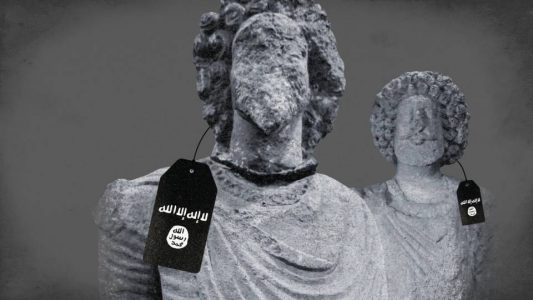
Islamic State terrorist group admit to looting oil and obscene amount of antiquities to fund its terror activities
An Islamic State mastermind has admitted his terror group looted oil and an “obscene amount of antiquities” to swell its war chest.
Iraqi-born Abdul Nasser Qardash, AKA The Destroyer, confessed in a jail interview that the looting and oil sales funded a multi-million-pound budget to recruit teenage boys and men.
He was arrested in May and is jailed in Iraq.
Qardash, 53, is awaiting trial, facing execution after leaving a trail of death, torture and other crimes across the Middle East. He told a think-tank interviewer: “We had an obscene abundance of antiquities.
“We tried to transfer the relics to Europe to sell them. This is especially true for Syrian relics.”
During several years of brutal reign over swathes of Iraq and Syria, IS destroyed Christian churches, Shia mosques and other historic buildings, looting treasures.
Ancient pottery, ornaments, metal containers, carved ivory, coins and statuettes earned a fortune.
Qardash was born in Tal Afar, in Iraq, and helped now deceased Abu Bakr al-Baghdadi form the IS terror network in 2011.
He said an IS ban on anyone else selling oil led to the group making millions from fuel sales. He explained: “This expanded the organisation’s economy and generated cash in excess of £350million, just from the smuggling of oil in western Iraq and eastern Syria.
“In 2015, my budget… amounted to approximately £180million.
“The budget would allocate an operational sum for soldiers, commanders and their families, and another for weapons purchases, equipment, raids and battles management, and weapon development.
“Money is the biggest factor in encouraging young people to volunteer.
“It is not possible to understand the rise of IS without factoring in the frustration that afflicted young people, as a result of the complex economic and social realities, especially… poverty and unemployment.”
He was interviewed by Husham Hashimi, an Iraqi working for US-based think-tank the Center for Global Policy.
Qardash – pipped to the post as IS leader after al-Baghdadi’s death last year – confirmed there had been a split in the group’s hierarchy, as he refused allegiance to the new leader.
Asked about the man who beat him to the top job, Qardash replied: “I pledged allegiance to al-Baghdadi and I am not obligated to pledge allegiance to Abu Ibrahim al-Qurashi.
Source: Mirror





